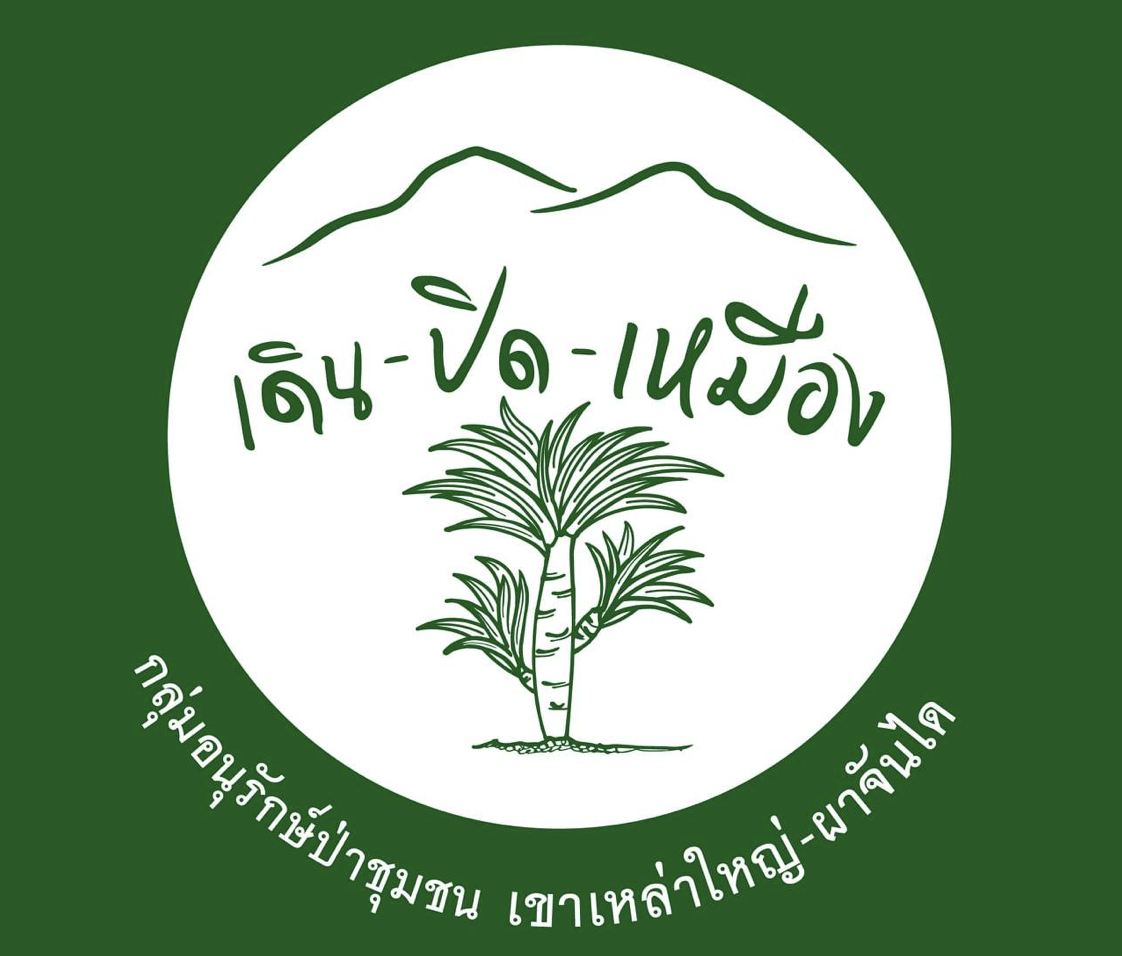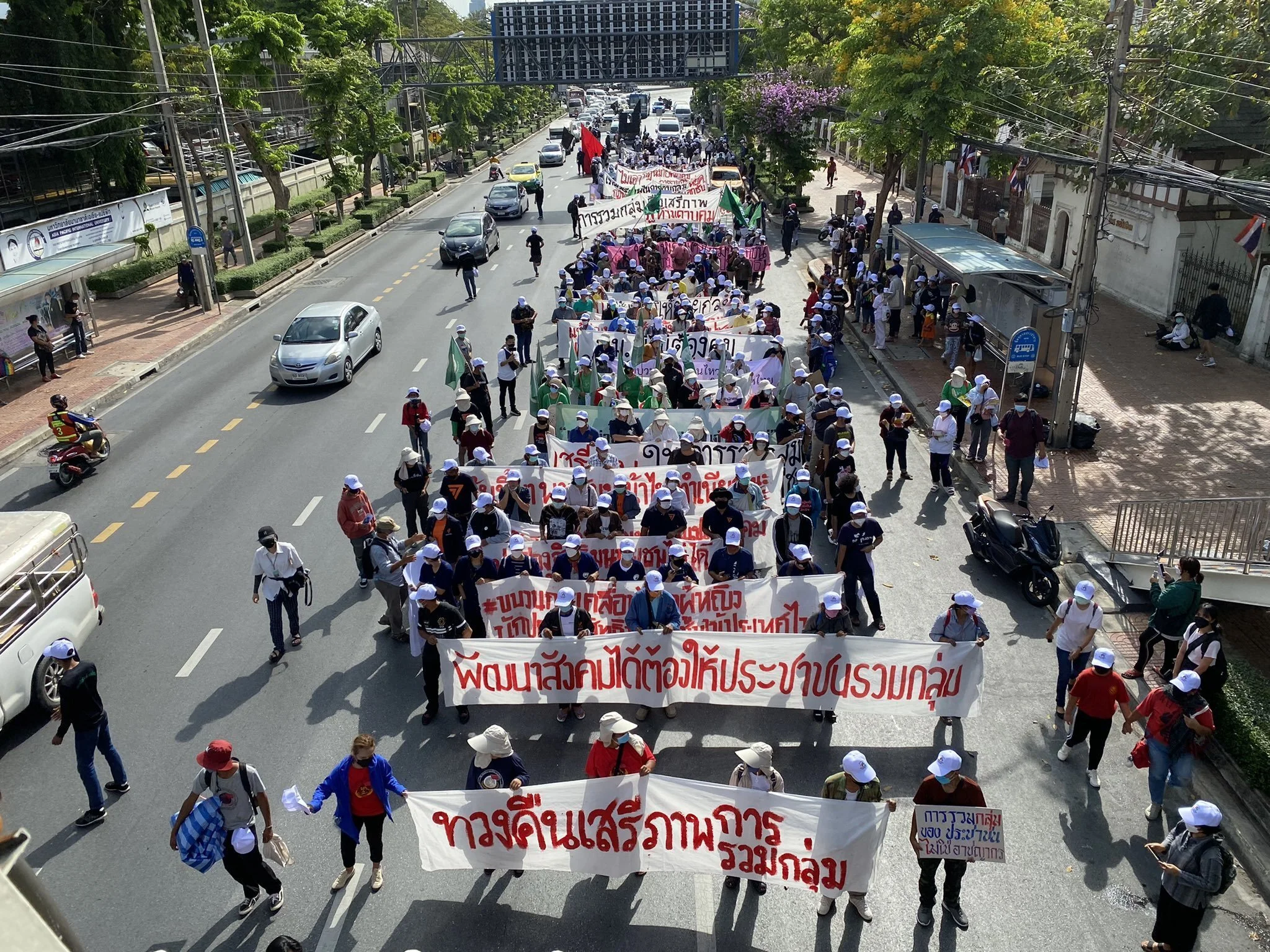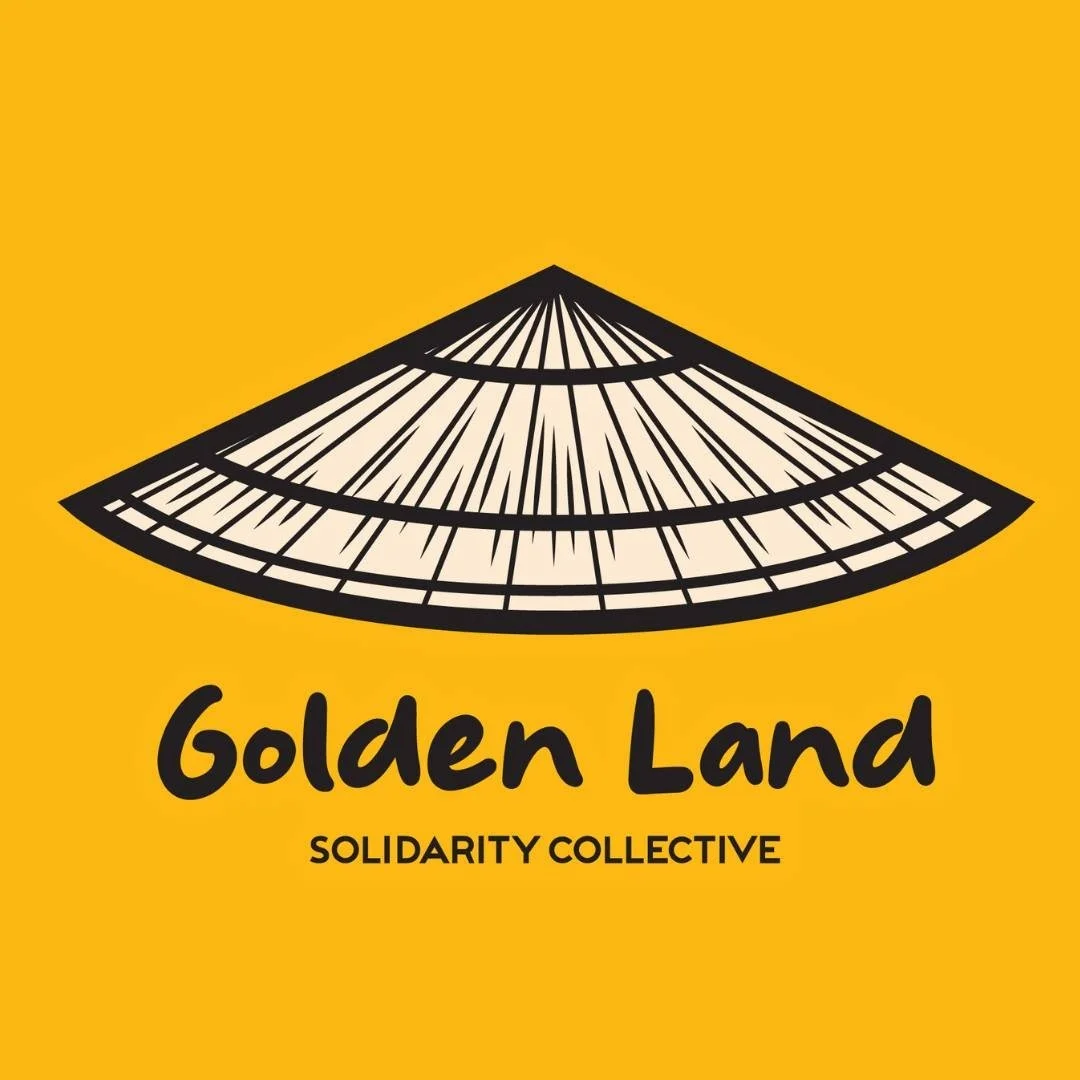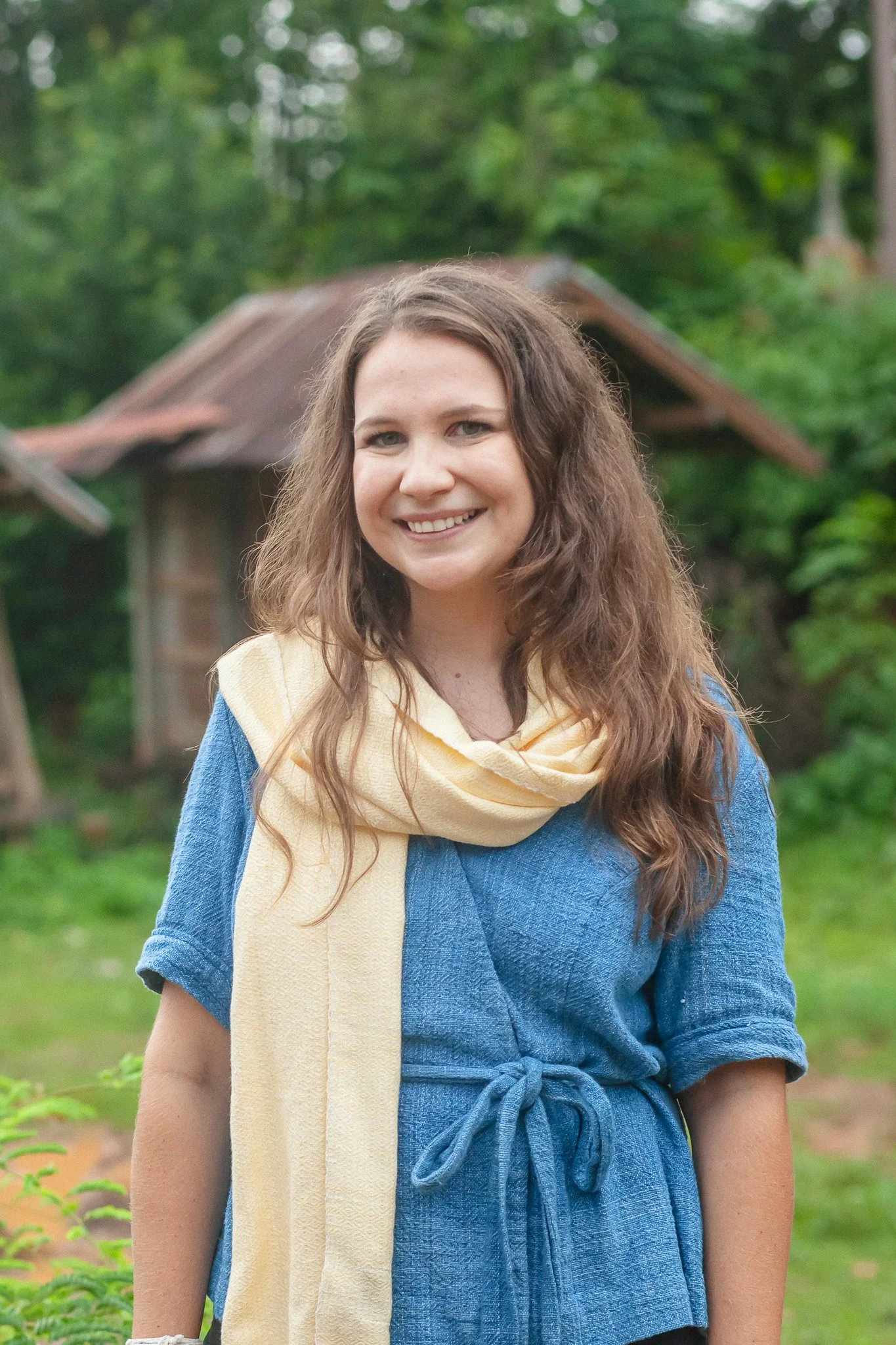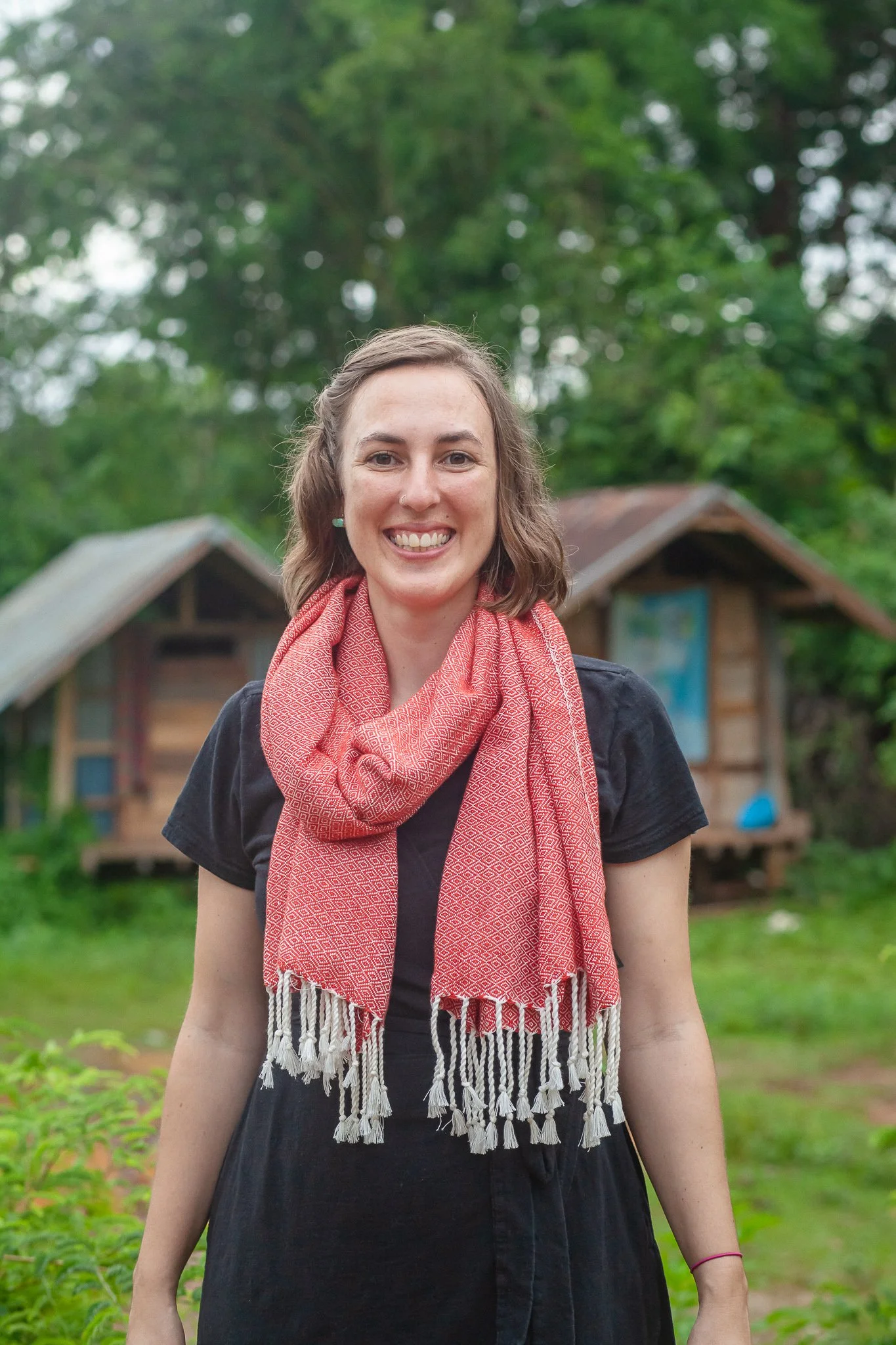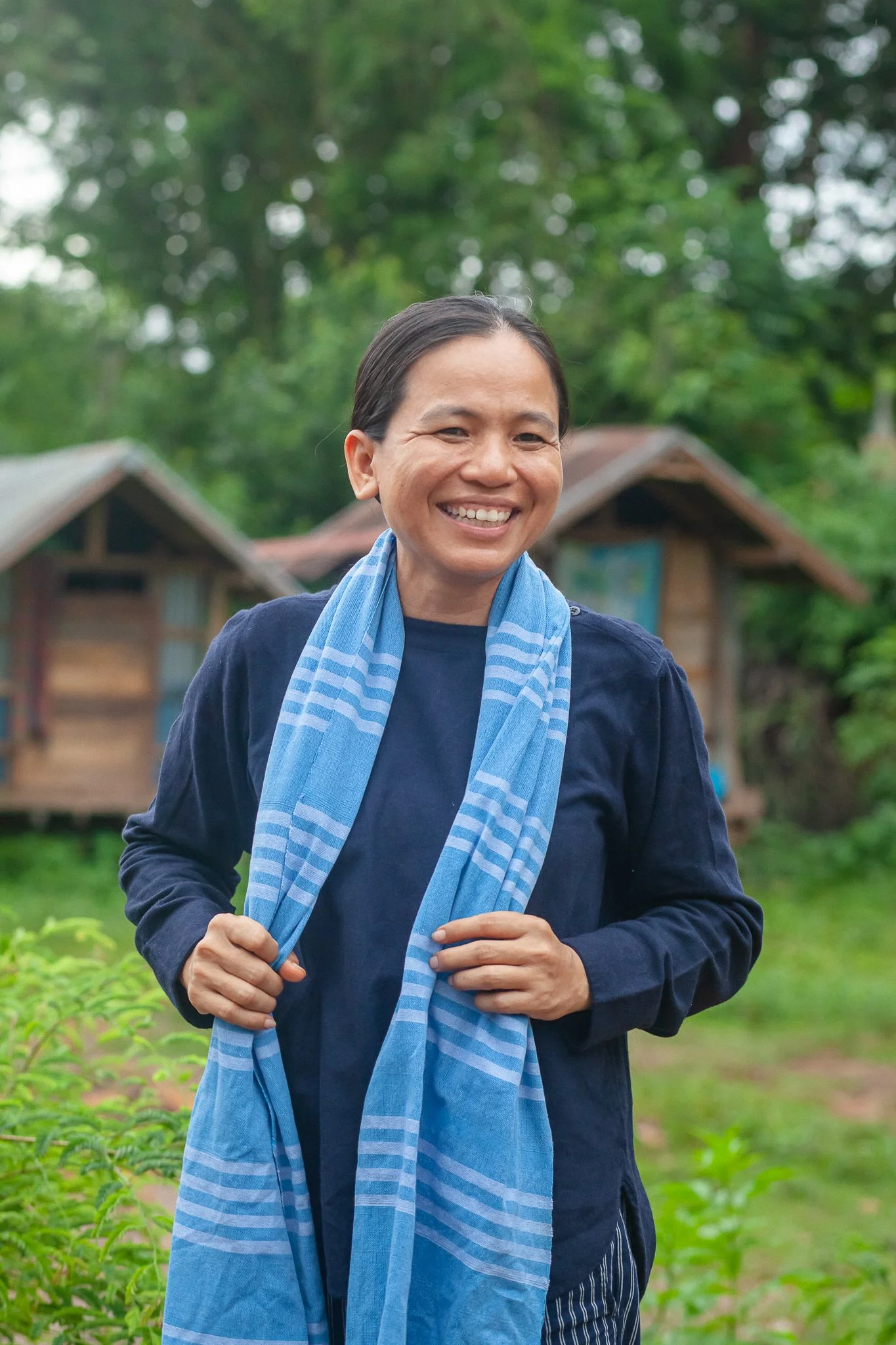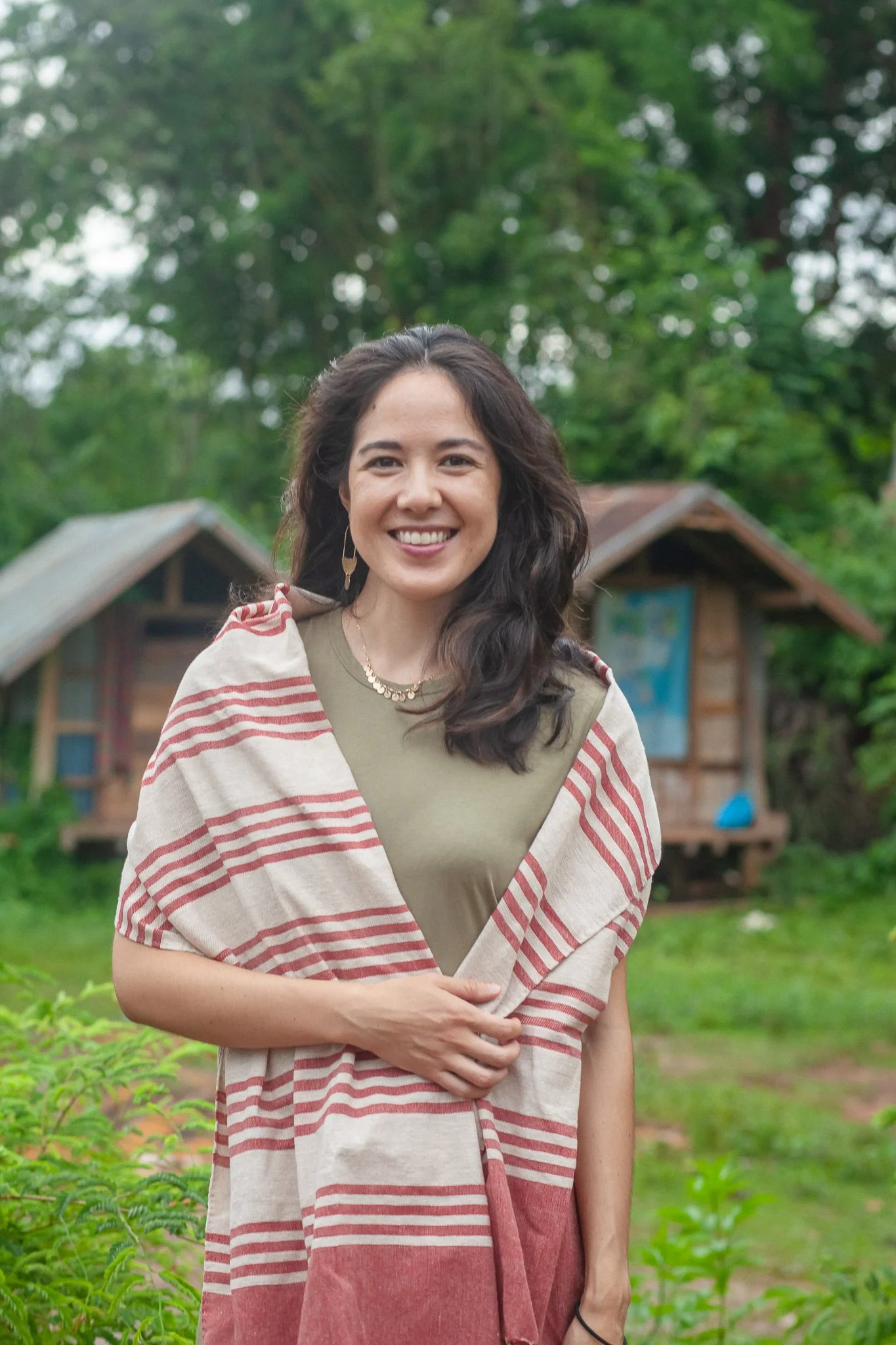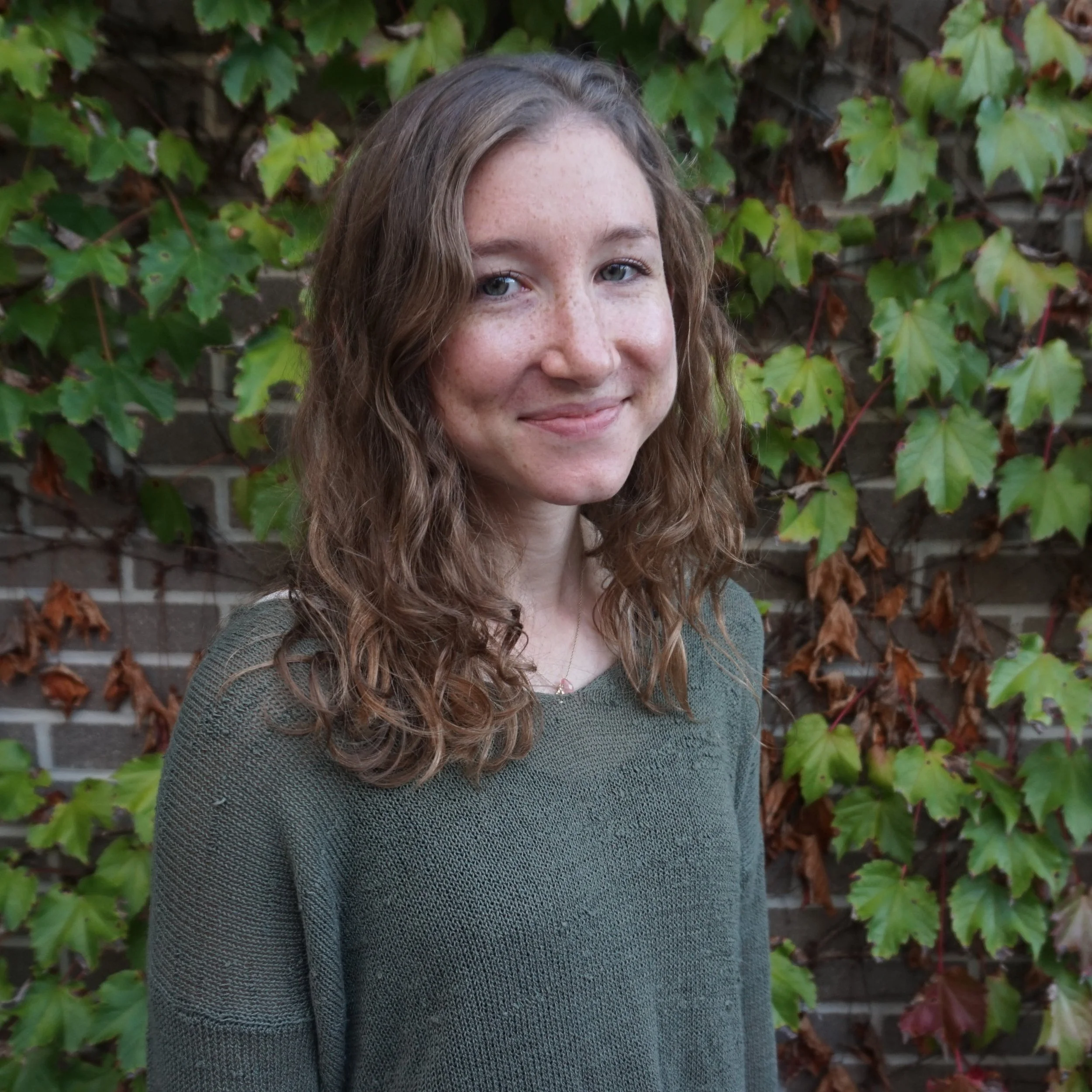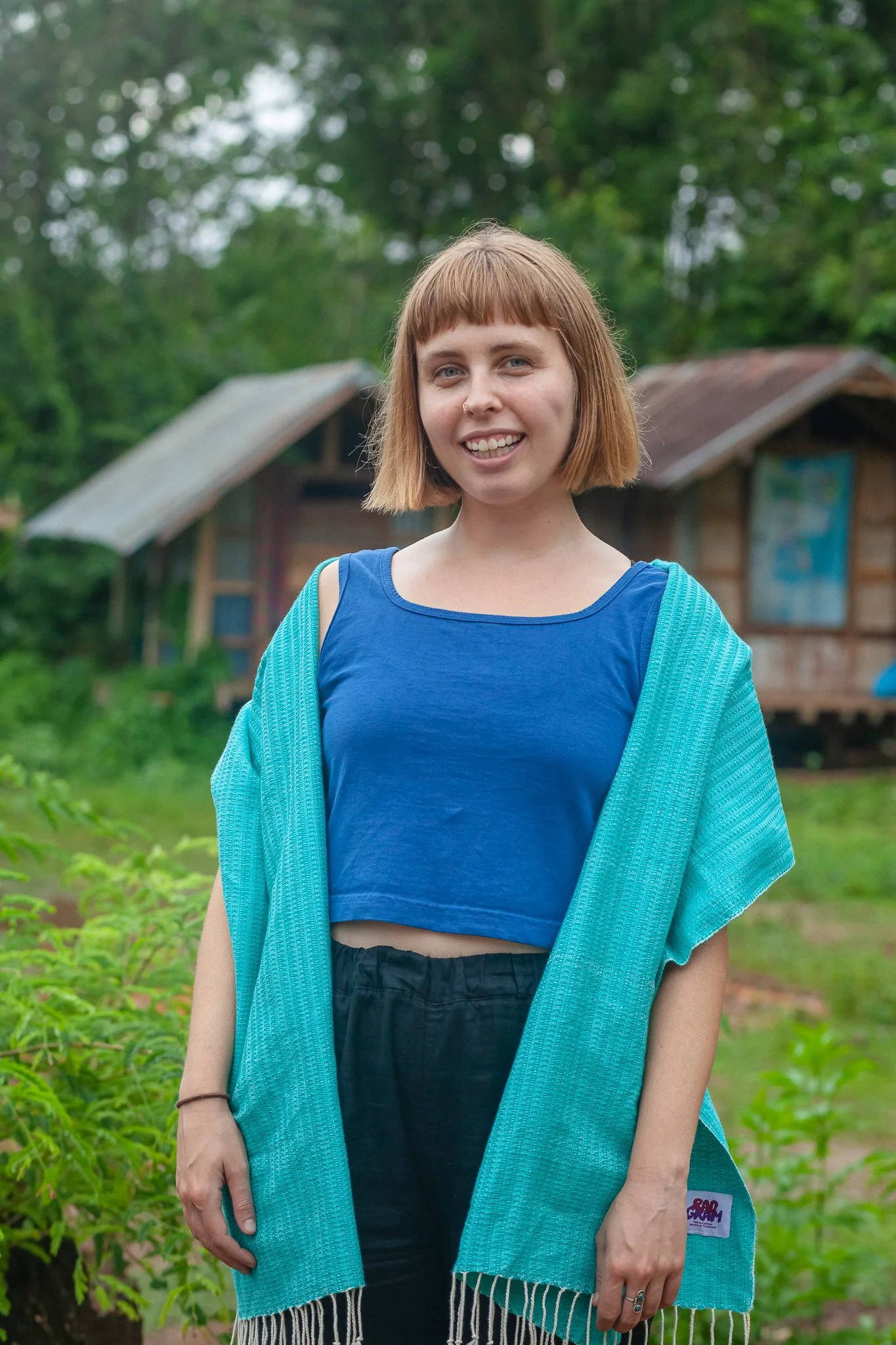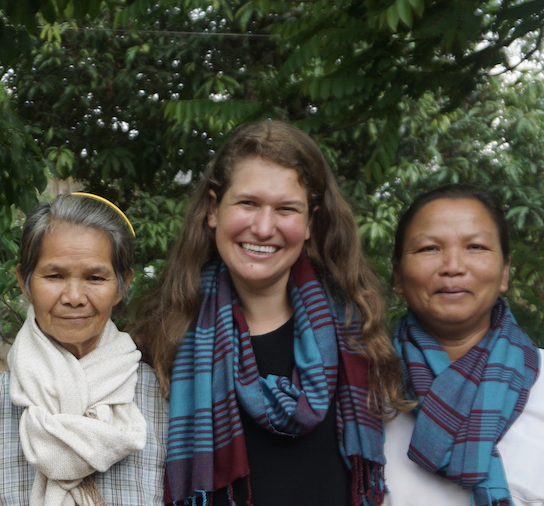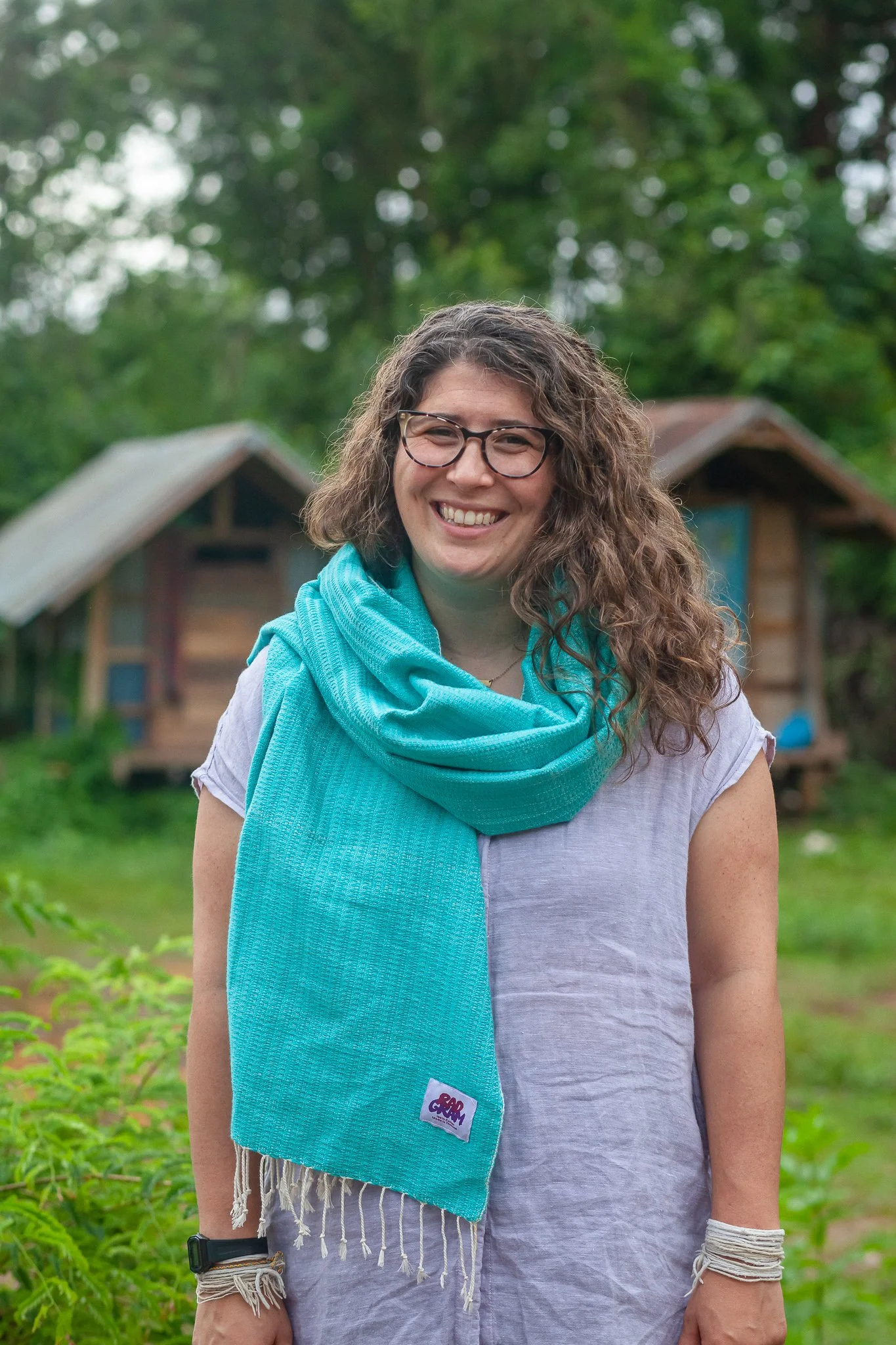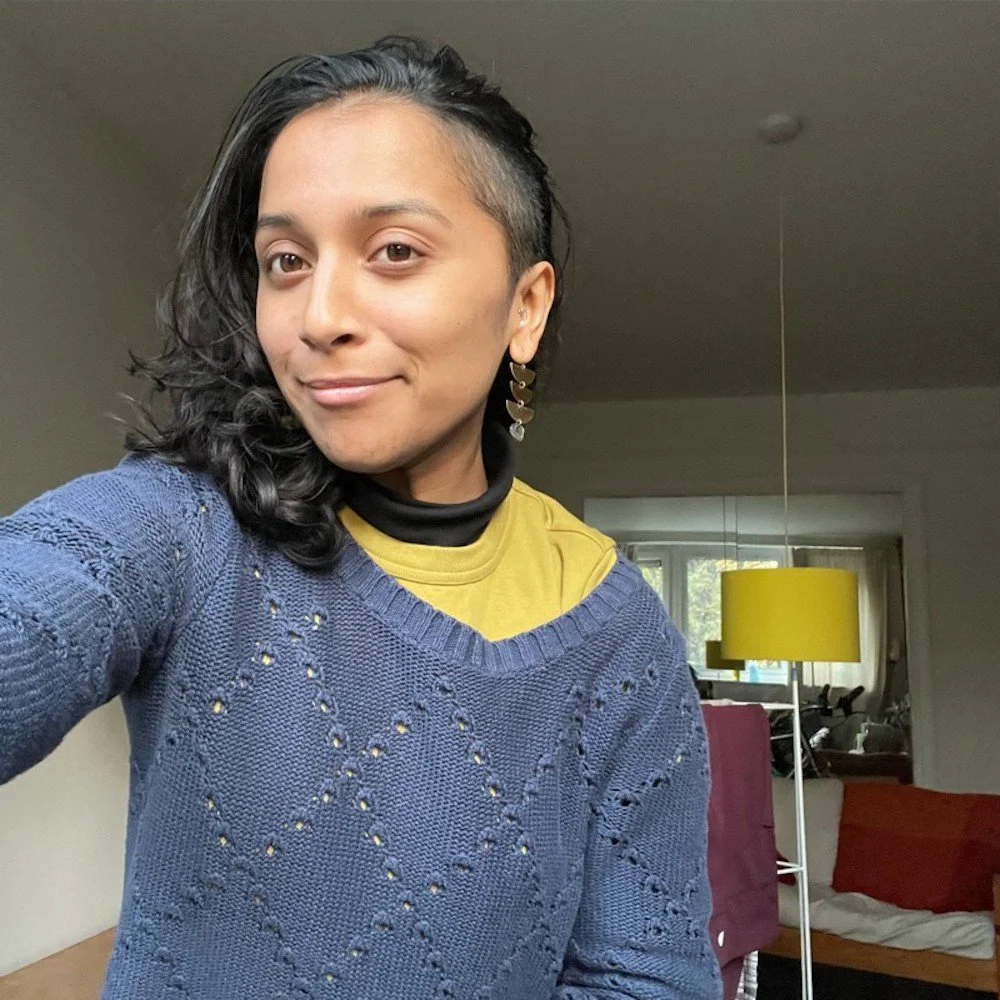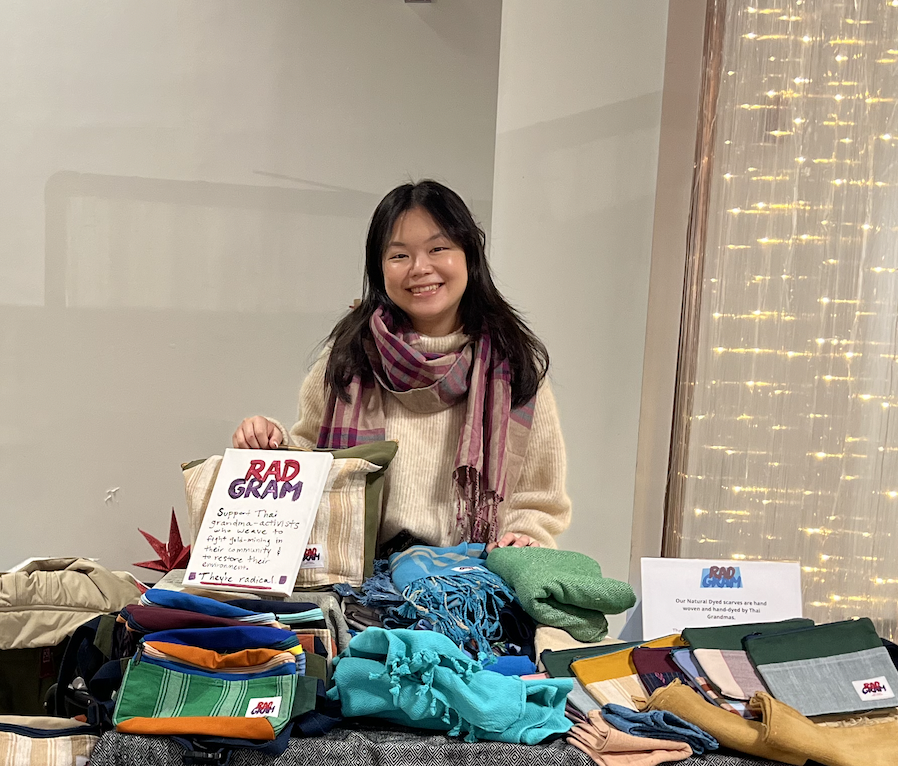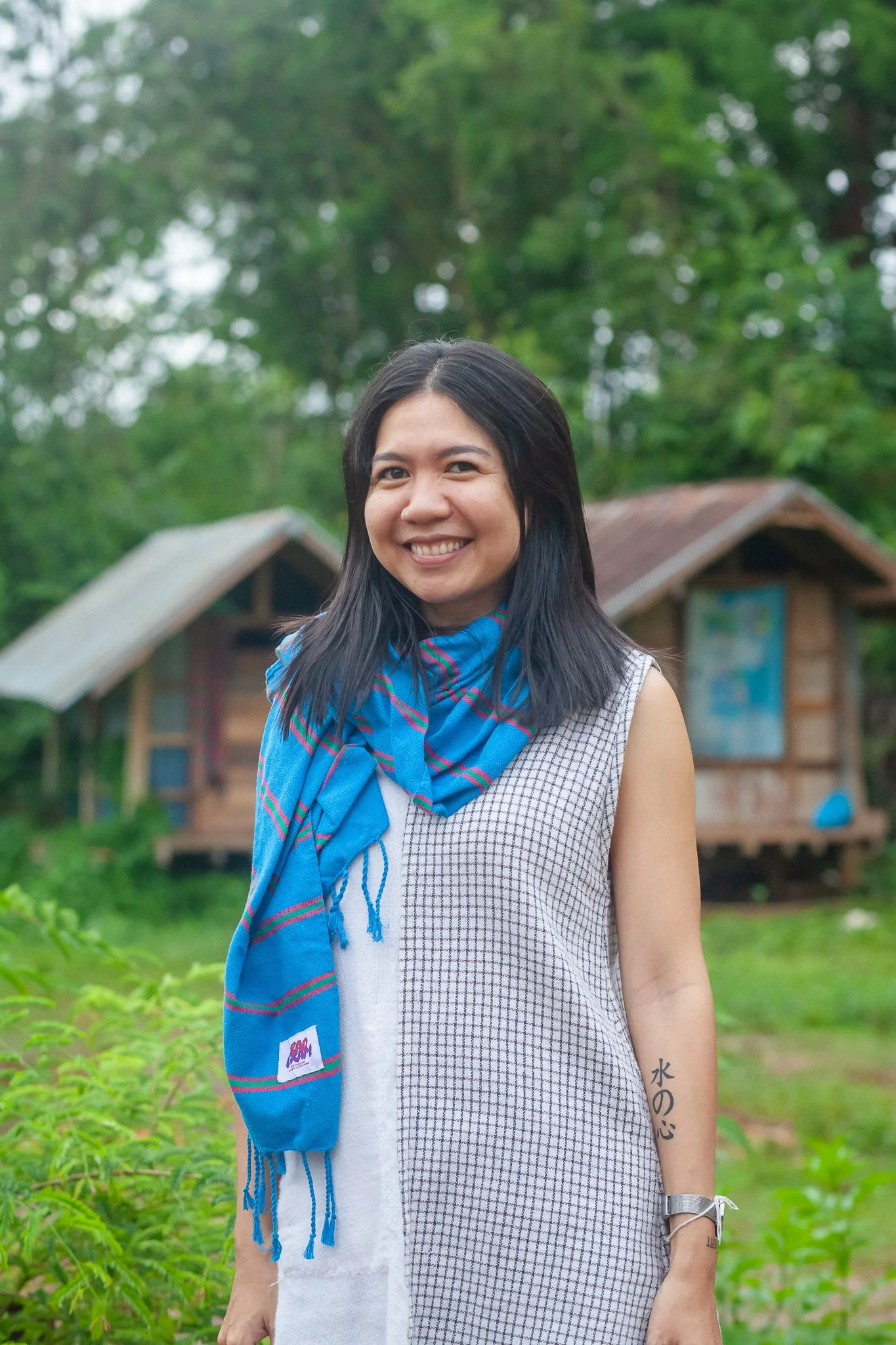Our Team
The Radical Grandma Collective began as a collaboration between four women from the U.S. and the radical grandma activist-weavers of Na Nong Bong, Thailand in 2016. The collective sought to bring the grandmas’ hand-woven scarves to an international market, raising funds to support the community’s struggle against the nearby gold mine. Our efforts have since expanded, and RadGram is now an organization that works in solidarity with human rights defenders across Thailand. Our name says it all—in Thailand, the grandmas are doing all of their own weaving, organizing, and fighting. Our role is to bring their stories to you.
Our Partners
Our Community Leaders
Ranong Kongsaen
Ranong is a community leader in KRBK and co-founder of the Radical Grandma Collective. She started the weaving group in 2008 as a means for villagers to fundraise for their environmental justice work.
Rotjana Kongsaen
Rotjana is a community organizer and WHRD in KRBK who works to organize her community and coordinate the grandmas in the weaving group. After working in Bangkok for a decade, she returned to her hometown in 2018 to support community development efforts.
Our Staff
Becky Goncharoff - Executive Director and Co-Founder
Having lived in Thailand for nearly a decade, she uses her understanding of Thai human rights defense, social movements, and experiential education to carry out the mission of the organization. Becky holds a Master’s Degree in International Relations from the University of Chicago and a Bachelor's Degree in Political Science from Transylvania University. In addition to her work as the Executive Director, Becky also teaches as a Lecturer in the Faculty of Political Science at Thammasat University in Bangkok.
-
In 2023, Radical Grandma Collective (RadGram) underwent a transformation, realizing our long-held vision of expanding beyond a scarf-selling project to broadly supporting environmental justice movements in Thailand. This year marked a significant shift as we began serving as a fiscal sponsor to partner organizations fighting extraction and promoting restoration, directing a total of $71,500 to grassroots groups that would otherwise not have access to traditional grants. We also launched a summer study abroad program in partnership with the University of Massachusetts Lowell, educating U.S. students about the intricate relationship between people and their environment. Through our organizing fund, we amplified environmental movements across Thailand while continuing to sell products from gold mine-affected communities, sharing their stories and supporting weaving for restoration.
A pivotal moment in our growth was hiring Bampen Chaiyarak (P'Aw) as our Community Impact Coordinator. On April 19 I had written in my journal, “Hiring P’Aw may be the most consequential thing we’ve ever done.” P’Aw is a woman of many talents. She authored "The Clouds of Mystery," a human-centered mining history of Thailand, fought against potash mining with the Ecoculture Study Group in Udon Thani, and co-founded Hom Dok Hang, a social enterprise focused on restoring indigenous rice varieties in Sakon Nakhon. As an academic expert on mining impacts and co-founder of the Building Restorative Culture of Thailand Coalition (RCCT), P'Aw now drives our work with partner communities to implement their restoration plans for the mine-affected areas.
Another highlight was bringing a new generation of students to our partner communities. Creating our own study abroad program to bring students to Northeast Thailand felt like a full-circle moment, as RadGram itself started as a student project 7 years ago. While it was our first time operating a program of this type as the lead institution, nothing felt more natural than to facilitate students learning about community restoration by living with environmental defenders and working alongside them to realize their social and environmental goals. RadGram began in a very similar way. This experience not only benefits students but also strengthens connections with the communities we serve.
Another highlight was bringing a new generation of students to our partner communities. Creating our own study abroad program to bring students to Northeast Thailand felt like a full-circle moment, as RadGram itself started as a student project 7 years ago. While it was our first time operating a program of this type as the lead institution, nothing felt more natural than to facilitate students learning about community restoration by living with environmental defenders and working alongside them to realize their social and environmental goals. RadGram began in a very similar way. This experience not only benefits students but also strengthens connections with the communities we serve.
The RadGram team in 2023 consisted of 3 part-time staff and a network of generous volunteers. Our work takes a movement-based approach. We strategize and operate in collaboration with many others working towards the same goal of strengthening community capacity to defend and restore their rights and ecosystems. We work alongside grassroots defenders, NGO organizers, human rights lawyers, students, academics, donors, and volunteers. We could not be more proud to be a small piece of this network. Together, we form a united front to resist extraction and restore communities, benefiting our partner communities and the world at large.
As we reflect on 2023, we're filled with gratitude for how far we've come and excitement for the future we're building together.
In solidarity,
Becky Goncharoff
Sam Ryals - Director of Operations
Sam joined the RadGram team in 2016. She manages the operations and social enterprise aspects of the organization along with Becky. Sam uses her decade of grassroots organizing and project management to ask big questions and dig into the details necessary to accomplish our objectives.
Bampen Chaiyarak - Community Impact Coordinator
Bampen Chaiyarak holds a Master’s degree in Anthropology from Silpakorn University, Bangkok, Thailand. She has experience working on environmental issues as a researcher and works on the ground with communities in the Northeast of Thailand and the Mekong region. She spends time developing effective communication for contemporary environmental issues and uses the data collected in the field to inform her work on resource management and ecological restoration projects.
-
I first heard of Radical Grandma Collective (RadGram) through the woven cloth made by the grandmothers of Na Nong Bong village and the surrounding area, who have been fighting against a gold mine in Loei Province, Northeast Thailand. The mine was eventually abandoned due to the community’s resolute struggle, but the mining company went bankrupt, leaving behind environmental pollution that infiltrated the food chain and human bodies. Heavy metals such as arsenic, mercury, manganese, and cyanide have contaminated the soil, water, aquatic life, plants, and rice, posing severe health risks. Despite a court ruling mandating environmental restoration, there has been no remediation from either the state mechanisms or the private companies involved.
At that time, I was working to support in developing a community-led restoration plan.
I frequently heard about RadGram’s educational programs, which facilitate international students in learning about the community by living with environmental defenders and working alongside them to achieve social and environmental restoration goals.
One day, I was contacted by Becky to assist as an interpreter and coordinator for a researcher in the community who was conducting research on sustainable clothing. This opportunity allowed me to learn more about RadGram’s activities, particularly their promotion of weaving, which is closely connected to the community’s economic restoration. Subsequently in early 2023, I became a part-time staff member of RadGram, serving as the Community Impact Coordinator.
I started my work with RadGram by expanding our educational program for international students to other communities, including Dong Mafai in Nong Bua Lamphu Province, Northeast Thailand, where the community is fighting against industrial rock mining. In Dong Magai, four community leaders sacrificed their lives to protect the mountain and those who remain continue to fight to stop the mining and restore the mountain that was damaged by the operations. They have been leading community-based restoration activities for three years since successfully closing the mine. They have established three pillars for their community development: 1.) Closing the quarry and stone mill, 2.) Restoring the mountain and forests, and 3.) Developing Dong Mafai as a tourist destination. We support this initiative by helping them train to welcome tourists through educational programs, enabling students to experience homestays in the community. Students have a once-in-a-lifetime opportunity to learn about society, culture, the environment, and democracy by living alongside village members. Students used their communication skills to support the community, developing content to promote tourism through their website and participating in community restoration activities such as annual mountain reforestation. They also presented the community’s restoration plan to the Subdistrict Administrative Organization (SAO) and proposed that the SAO adopt a resolution based on the village’s public consensus to revoke the industrial rock mining area declaration by the Ministry of Industry, preventing the quarry from returning to the community.
In Loei Province, where the gold mine is located, RadGram has continued our educational programs, collaborating with the community to restore forests in the abandoned gold mining area using native plant species. We have also worked with the weaving group to revive the culture of growing traditional cotton varieties through organic farming, initiated the development of a weaving school to connect knowledge across generations, and collaborated with academics and the media to elevate the issue of holistic community restoration based on global restoration principles. This value-based restoration serves as a decision-making framework for environmental management, linking social and ecological restoration goals to create a new society and ecosystem that supports people. Additionally, the community has been trained in public narrative techniques to communicate their restoration initiatives and empower themselves to transform and overcome the risks left behind by the gold mine’s toxic legacy.
Over 2023 we have also began exploring ways to support other communities affected by environmental issues and human rights violations, such as those impacted by the forest reclamation policy, the Kham Pa Lai Community Forest Conservation Group in Mukdahan Province, and other civil society networks in Northeast Thailand.
My first year with RadGram felt like it passed very quickly because the strength of the partner communities we work with has empowered us to better support their efforts in rebuilding communities that have been invaded and destroyed. Every day, I see these communities growing stronger.
Bampen Chaiyarak
Our Board of Directors
Mariko Powers - Board President
Mariko is a co-founder and President of the Board of the Radical Grandma Collective. She was introduced to Northeast Thailand through a study abroad program focused on Development and Globalization in 2011 and returned from 2015-2016 to further deepen her relationships with communities impacted by extractive industries. She holds a Master’s degree in International Environmental Policy from the Middlebury Institute of International Studies in Monterey and currently works in the philanthropy sector supporting global ocean conservation at Oceankind.
-
In a world increasingly connected by physical and digital bridges, we have more opportunity than ever to become inspired by the everyday heroes around us. Despite this connectivity, it still feels like we have little awareness of local leaders and their stories, let alone an ability to interact with and learn from them. That’s why I’m grateful that Radical Grandma Collective (RadGram) serves as my bridge to incredible communities fighting for land rights, resisting extractive projects, and advocating for development agendas that center their integrity. Participating in this work serves as a constant reminder that ordinary people — rice farmers, rubber harvesters, and grandmas – are often extraordinary in their vision of collective prosperity, and in their determination to realize that vision.
RadGram’s work is work that it’s rooted in genuine connection; our approach to collaboration is born from intercultural exchange, shared experience, and mutual learning. This solidarity results from time spent together, which is why it's important to me to periodically make my way back to Thailand to reconnect with our friends engaged in grassroots social movements on the frontlines.
While I had grown to love and admire the grandma-activists of the gold-mine impacted communities in Loei through our 10+ years of collaboration with KRBK, I had not been to Dong Mafai, a community that RadGram began partnering with in 2022, until this past year.
Dong Mafai may be a more recent partner to RadGram, but their anti-mining resistance movement is long and storied. In 2023, a regional administrative court finally revoked the permits of the limestone quarries in Dong Mafai after the community sustained a 30 year struggle against the mining operation. Community leaders now hope to position the district as an eco-tourism destination, with the understanding that increased visibility of the rich ecological and archaeological history of the area could support local livelihoods and culture and prevent the mine reopening.
I was fortunate to spend three days in Dong Mafai sharing meals over sticky rice with community leaders, riding in the bed of a tractor out to farms and temples, and enjoying dark nights under the stars. We hiked to mountains with stunning 3000 year old cave paintings and even more beautiful views of the surrounding landscape, and we foraged bamboo shoots and mushrooms in lush forests that the community hopes to manage now that the mine is closed. Such community-based tourism provides a unique lens into a country that’s otherwise known for its tuk-tuks, elephants, and water festivals. Few are aware that Thailand is also the country with the most rewritten constitutions, with a political history mired in cycles of democratic crisis, military coups, and decades of popular resistance.
Intercultural exchange should call on us to engage with these complexities and difficult histories, and educate us on the ways that we can make a difference for the communities so generously sharing the stories of their struggles. I see Radical Grandma Collective’s role as shortening the perceived distance between environmental justice movements in Northeast Thailand and our own backyard, knowing that our ability to leverage power, resources and visibility to amplify their cause is the living practice of solidarity. Toward those ends, we are supporting Dong Mafai to launch an eco-tourism website and establish a community-based travel program, with the aim of helping them attract more visitors to appreciate the land they struggled so hard to protect.
As they say, we protect the places we love, and we love the places we know. My hope is that many more visitors find their way to Dong Mafai and come to know, love, and defend it just as fearlessly as its residents do. And for those of you who can’t make your way there, I hope that we can bring the voice and resilience of Dong Mafai to you.
Mariko Powers
Sam Usavage - Board Secretary
She joined the team in 2021 after connecting with the Radical Grandma Collective in 2017 during a study abroad program in Thailand. She is passionate about the power of business for making change and promoting responsible consumerism and brings e-comm operations and product innovation experience to the team. Sam holds a Bachelor’s degree in Supply Chain Management from Penn State University and works to match supply chain practices with solid sustainability principles.
Zoe Swartz
Zoe is a co-founder and a member of the Board. Her expertise in making complex situations into accessible, engaging stories helps educate consumers on the women behind the Radical Grandma products. Zoe is a Master of Landscape Architecture Candidate at the University of Texas-Austin with an interest in public interest design, visual storytelling, and the relationship between the healing of the land and the healing of people.
Katie Mathieson - Board Treasurer
Katie is the Board Treasurer and co-founder. Her role as the Director of Davidson Outdoors at Davidson College allows her to provide experience in group facilitation, risk management, and financial management. Katie holds a Bachelor’s degree in Environmental Studies from Davidson College. Whenever she can, Katie also enjoys spending time designing graphics and creating video content for RadGram.
Larissa Gaias
Larissa is a board member on the community impact team. She joined the board in 2022 after studying in northeastern Thailand between 2010-2012 and volunteering with Radical Grandma Collective in 2021. She brings her experience conducting community-grounded research to support the well-being of youth and other community members through the development, implementation, and evaluation of equity-explicit practices and policies. She holds a PhD in Family & Human Development and works as a faculty member at the University of Massachusetts Lowell.
Praveena Fernes
Praveena is a board member and joined the Radical Grandma Collective team in 2017. She brings expertise in community-based participatory research and ethical storytelling to RadGram. She holds a Bachelor’s degree in Public Health from Tulane University, a Master’s Degree in Political Ecology from SOAS University of London, and is currently a PhD candidate at the London School of Hygiene and Tropical Medicine at the University of London in the field of Public Health & Policy. Her work strives to decrease health inequities through transdisciplinary research-to-action partnerships between scholars and rights-holders.
Pang Boonbaichaiyapruck
Pang is a board member and joined the Radical Grandma Collective team in 2022. She is from Bangkok and is excited about textiles, community, and sustainability. She holds a Bachelor’s degree in International Relations from Pomona College and currently works in renewable energy investments.
Sulakshana Lamubol
Sulakshana Lamubol (Fai) is a board member on the community impact team. She joined RadGram as a volunteer and joined the board during 2022-2023. She brings vast experiences working in Thai and regional civil society to support RadGram’s strategic engagement and protection work with communities and human rights defenders. She is passionate about environmental justice, art and textiles, and solidarity building across groups and countries. She holds a M.A. in Public Policy from Central European University in Hungary and a B.A. in History and Political Science from Chulalongkorn University in Thailand.
Emily Anderson
Emily joined RadGram’s board as a volunteer in 2022 and as an official member in 2023. She has primarily worked for environmental organizations focusing on biodiversity and conservation; however, she is passionate about human rights defense, environmental justice, and connecting people to urgent issues through storytelling. She holds a BS in Ecology and Environmental Science from the University of Maine and a Master’s degree in Environmental Law and Policy from Vermont Law & Graduate School.
Volunteers
We have many people that support our work every day, from hosting markets, lending creative talents, and communicating our message. Thank you: Alexandra Dalferro, Beth Eanelli, Cait Goss, Dre Liuliu, Greg Francois, Komal Kaur, Megan Curling, Taylor Dykes, Sofia Antonelli, and MANY others


